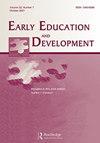幼儿课堂教师抑郁症状与师生对话质量
IF 2.1
3区 教育学
Q1 EDUCATION & EDUCATIONAL RESEARCH
引用次数: 0
摘要
本文章由计算机程序翻译,如有差异,请以英文原文为准。
Teachers’ Depressive Symptoms and Teacher-Child Conversation Quality in Early Childhood Classrooms
ABSTRACT Research Findings: We examined whether Head Start teachers’ depressive symptoms are associated with their engagement in high-quality conversations with children, and we considered the extent to which this association is consistent across classroom contexts and activities. Observations of Head Start teachers’ conversations with children were conducted using a teacher-focal coding system and teachers reported on depressive symptoms. Generalized estimating equations were used to test study hypotheses. Teachers’ depressive symptoms were negatively associated with the likelihood that a high-quality conversation would occur during an observation interval. The relation between teacher depressive symptoms and high-quality conversations was negative during both structured settings and free choice settings. This relation also remained negative during play (e.g. art, music) and routine (e.g. personal care, clean up) activities. However, the relation between teacher depressive symptoms and high-quality conversations was not significant during academic activities (e.g. math, books, language). Practice or Policy: Potential explanations, strengths and limitations, and implications for study results are discussed.
求助全文
通过发布文献求助,成功后即可免费获取论文全文。
去求助
来源期刊

Early Education and Development
Multiple-
CiteScore
5.50
自引率
10.30%
发文量
78
期刊介绍:
Early Education and Development (EE&D) is a professional journal for those involved in educational and preschool services and research related to children and their families: early education supervisors, school psychologists, daycare administrators, child development specialists, developmental and child clinical psychologists, and special education administrators. It is designed to emphasize the implications for practice of research and solid scientific information. The age range focused upon is preschool through the primary grades. EE&D is a connecting link between the research community in early education and child development and school district early education programs, daycare systems, and special needs preschool programs.
 求助内容:
求助内容: 应助结果提醒方式:
应助结果提醒方式:


